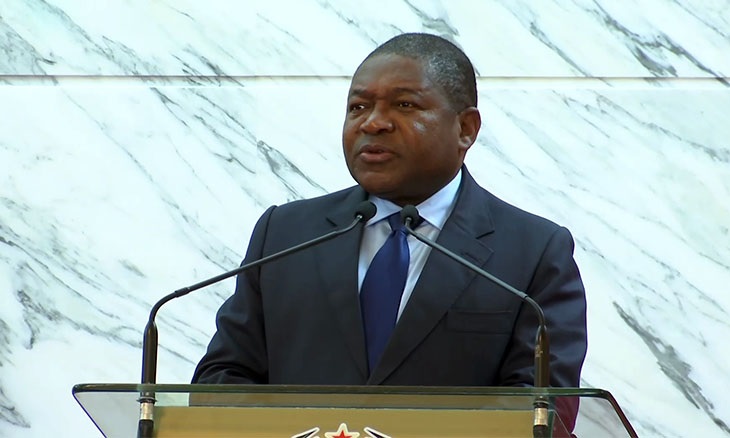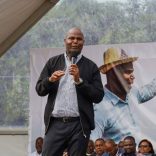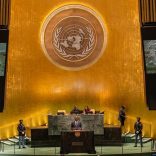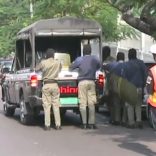Mozambique: Chapo claims violent unrest had nothing to do with elections
Mozambique / Covid-19: Nuysi announces further restrictive measures – AIM report

Photo: O País
Mozambican President Filipe Nyusi on Thursday night announced a series of new restrictive measures intended to halt the spread of the Covid-19 respiratory disease, and prevent any possible collapse of the Mozambican health system.
Mozambique is now in the grip of the third wave of the pandemic, which was proving more severe and more lethal than either of the first two waves. Nyusi said that, in the first 15 days of July, 18,511 new cases had been recorded, which was three times higher than the entire month of June. 810 people had been hospitalised in the past fortnight which was double the number for all of June, and 406 of these people remain in the Covid-19 wards. There had been 179 deaths so far in July, compared with just 44 for all of June.
This was putting an enormous strain on the health service. Nyusi warned of the possibility that intensive care units could run out of beds and oxygen for patents, and out of personal protective equipment for health workers. There was also only a limited supply of the PCR (polymerase chain reaction) tests – the standard tests used to determine whether a person is infected with the coronavirus that causes Covid-19.
“We don’t want our country to reach this stage where people are dying for lack of oxygen”, declared the President.
“The pandemic is far from its end”, he warned, and the victims are not just the elderly, but also young people and even children.
“We are all called upon to preserve our health and our economy”, he urged, and that meant obeying the basic preventive measures, including isolation of those who test positive for the virus.
But in recent weeks there had been “general non-compliance” with preventive measures. Instead of avoiding crowds, citizens were going to parties, or playing football in their neighbourhoods.
Wearing masks in public places is supposed to be obligatory. But television reports from across the country have shown people going about their business without masks. Only in the last few days have the police begun to crack down on people who are not wearing masks.
Nyusi announced that all the existing restrictions remain in place, but will be tightened. The overnight curfew will now be extended by an hour, beginning at 21.00 rather than 22.00 and lasting until 04.00 the following morning. The curfew now extends to all cities and towns.
All religious ceremonies, conferences and meetings are suspended. All private social events are banned with the exception of weddings. A maximum of 20 people can attend a wedding, but there can be no parties or receptions afterwards.
Meetings in public or private institutions are allowed, but attendance must not exceed 15 people in closed spaces or 30 in the open air. State meetings or events may take place, if duly authorized, and with no more than 80 people in attendance.
The number of people who may attend funerals has been reduced to 20, but if the deceased died of Covid-19 no more than ten mourners may attend.
No events may be held in casinos, cinemas, theatres and the like. Museums and galleries remain open, but no more than 20 per cent of their capacity may attend events held there.
All gymnasiums are closed, as are public swimming pools. Pools in hotels may continue to function, but only for guests and at no more than 20 per cent of their capacity.
Except for essential services, public institutions will only be open from 08.00 to 14.00 (rather than the normal closing time of 15.30). The private sector is encouraged to follow the same timetable.
Trading hours are reduced. Shopping centres should open at 09.00 and close at 16.00 from Monday to Saturday, and from 09.00 to 13.00 on Sundays and public holidays. Bottle stores, and other premises licensed to sell alcohol, must close at 13.00 from Monday to Saturday, and must remain closed on Sundays. The opening hours for restaurants are from 06.00 to 18.00 every day.
Stalls selling food may operate between 06.00 and 17.00, but the complete ban on bars, stalls and kiosks selling alcohol remains in place. The opening hour for bakeries are from 05.00 to 18.00.
Many schools, particularly in the main cities, will effectively be closed. Nyusi announced a ban on face-to face teaching in primary, secondary and higher education in the Greater Maputo Metropolitan Area, Xai-Xai, Inhambane, Beira, Chimoio and Tete. This measure does not affect anywhere north of the Zambezi, which is less affected by Covid-19 than the south and centre of the country.
All pre-school education will be closed for at least 30 days. Creches and nurseries had been closed for over a year, but were allowed to re-open in late June. The decision to close them again will come as a blow to children, parents and crèche workers, some of whom are looking at the possibility of teaching children, in small numbers, at home.
Nyusi also announced that all travelers arriving in Mozambique must present a negative PCR test taken within the 72 hours prior to their departure, even if they possess a vaccination card. This measures also applies to children over five years of age.
To avoid queues building up at the offices which issue documents, the validity of all personal documents, except passports, has been extended to 30 August.
Nyusi explained that the purpose of most of the measures he announced is to prevent the gathering of sizeable numbers of people. The measures take effect on Saturday, and will last for 30 days, but may be reviewed after 15 days..













Leave a Reply
Be the First to Comment!
You must be logged in to post a comment.
You must be logged in to post a comment.